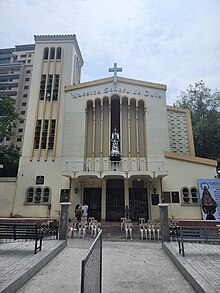Ermita Church
| Ermita Church | |
|---|---|
| Archdiocesan Shrine of Nuestra Señora de Guia | |
| Archdiocesan Shrine of Our Lady of Guidance | |
La Ermita de Nuestra Señora de Guía (Spanish) | |
 Church façade in May 2024 | |
 | |
| 14°34′43″N 120°58′47″E / 14.5786°N 120.9798°E | |
| Location | Ermita, Manila |
| Country | Philippines |
| Denomination | Roman Catholic |
| History | |
| Former name(s) | Hermitage of Our Lady of Guide |
| Status | Shrine |
| Founded | 1606 |
| Dedication | Nuestra Señora de Guía |
| Associated people | Miguel López de Legazpi |
| Architecture | |
| Functional status | Active |
| Architect(s) | Carlos A. Santos-Viola |
| Architectural type | Chapel |
| Style | Modern |
| Groundbreaking | 1947 |
| Completed | 1953 |
| Administration | |
| Archdiocese | Manila |
| Deanery | Nuestra Señora de Guia[1] |
| Parish | Nuestra Señora de Guia |
| Clergy | |
| Rector | Estelito Villegas |
| Vicar(s) | Daniel Voltaire Hui |
| Dean | Joel de Leon Rescober[2] |
The Archdiocesan Shrine of Nuestra Señora de Guia, commonly known as Ermita Shrine or Ermita Church, is a Roman Catholic church and shrine located in the district of Ermita in the city of Manila, Philippines. The church is home to the Marian image of the Immaculate Concepcion known as Nuestra Señora de Guía, which is considered to be oldest in the Philippines, and in whose honor the church is officially named after and dedicated to.[3][4]
History
[edit]
The church began as a rustic shrine made of bamboo, nipa, and molave wood that was built to house the image of Our Lady of Guidance in the area where it was found in 1571 by Spanish soldiers under Miguel López de Legazpi. The shrine eventually became a chapel built in 1606 as house for the image and was called La Hermita ("The Chapel" or "Hermitage" in English).[5] The word also gave the name to the present district in Manila where the chapel is located. A Mexican Hermit-Priest came to the area and built a hermitage there, thus, transforming its name to Ermita. Juan Fernandez de Leon who was a hermit from Mexico before relocating to Manila, was responsible for building Hermita up.[6]
The church was damaged many times due to earthquakes. In addition, the image had to be transferred to the Manila Cathedral for safekeeping during the British occupation of Manila in 1762–1764. A more permanent stone church was built in 1810; the image was returned to the church in 1918.[4]
In 1945 near the end of World War II, the church was reduced to rubble during the Battle of Manila. However, the image was saved from destruction and was temporarily kept in a private residence.[7] Work began for the reconstruction of the church in 1947 with a new design by architect Carlos A. Santos-Viola.[8] On March 28, 1949, attorney and future senator Jose W. Diokno married Carmen Icasiano at Ermita Church. Diokno was also baptized here on September 3, 1922, his godmother and second mother was Paz Wilson. By 1953, the reconstruction was completed and the image was returned to the new church.
On December 3, 2005, Manila Archbishop Cardinal Gaudencio B. Rosales elevated the status of this church to an archdiocesan shrine.[9]
Vicariate of Nuestra Señora de Guia
[edit]The church is under the jurisdiction of the Archdiocese of Manila under the vicariate forane of Nuestra Señora de Guia. Aside from the parish church, the vicariate covers the following churches:[1]
- Manila Cathedral
- San Agustin Church, Intramuros
- San Vicente de Paul Parish, Ermita
- Malate Church
- Our Lady of the Assumption Parish, Malate
- Sto. Niño de Baseco Parish, Baseco, Port Area
Gallery
[edit]-
Old facade (2014)
-
Church interior in 2014
-
Nuestra Señora de Guia enshrined in the church altar
-
Archdiocesan Shrine markers
References
[edit]- ^ a b "Vicariate of Nuestra Senora de Guia". Roman Catholic Archdiocese of Manila. Retrieved February 26, 2021.
- ^ "Appointment of Episcopal Vicars and Vicars Forane". Retrieved June 10, 2023.
- ^ "About Ermita Church". Ermita Church. Archdiocesan Shrine of Nuestra Señora de Guia.
- ^ a b "Nuestra Señora de Guia, Ermita, Manila". Organographia Philipiniana.
- ^ "ermita". SpanishDict.com. Retrieved on January 12, 2015.
- ^ "Jesuits In The Philippines (1581-1768)" Page 132 "In 1591 there arrived in Manila a secular priest named Juan Fernandez de Leon. He had led a hermit's life in Mexico and planned to continue it in the Philippines. For this purpose he built himself a retreat near a wayside shrine just outside the city walls which was dedicated to Our Lady of Guidance, Nuestra Sehora de Guia. His hermitage later gave its name to the entire district, which is called Ermita to this day."
- ^ DeAnda (November 22, 2009). "In Honor of Nuestra Señora de Guia". With one's past... Retrieved on 2014-01-12.
- ^ "Malate – Ermita District: Part 3". Manila Nostalgia. July 21, 2013.
- ^ Darang, Josephine (May 15, 2011). "Ermita celebrates 440 years of devotion to La Guia". Philippine Daily Inquirer. Archived from the original on October 26, 2014.
External links
[edit] Media related to Ermita Church at Wikimedia Commons
Media related to Ermita Church at Wikimedia Commons- Ermita Church on Facebook
- Roman Catholic churches in Manila
- Buildings and structures in Ermita
- 1606 establishments in the Spanish Empire
- Cultural Properties of the Philippines in Metro Manila
- Churches in the Roman Catholic Archdiocese of Manila
- Buildings and structures of the Philippines destroyed during World War II
- Jubilee churches in the Philippines





